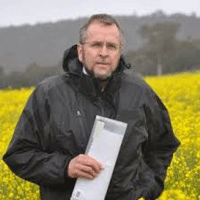May 4, 2015
Innovative approach to crop breeding to be featured in prestigious agronomy lecture May 6

International plant breeder Wallace A. Cowling will present the 31st annual Elmer G. Heyne Crop Science Lectureship at 4 p.m. May 6 in 1018 Throckmorton Hall. The title of the lecture is "Small Changes with Potentially Large Benefits in Crop Breeding." A reception will be at at 3:30 p.m. in first floor Throckmorton Hall lobby prior to the lecture.
Cowling is a professor and plant breeder at the University of Western Australia's Institute of Agriculture in Perth, Australia. He has worked for both commercial and public interests in his plant breeding career, and has been responsible for seven lupin and 22 canola varieties, and is currently breeding hybrid canola.
Recently, Cowling has developed a new version of F1 recurrent selection, which accelerates the response to selection in self-pollinated crops. His method is based on the "animal model," which has a long history of successful use in animal and perennial tree breeding. An excerpt from the abstract of his presentation states:
Many successful animal breeding programs have faster genetic progress than crop breeding programs, with lower rates of inbreeding. This seminar explores relatively small changes which may have a large impact on the outcome of breeding self-pollinating crops. Crossing and recombination in a self-pollinating crop normally occurs after selfing and selection of pure lines. We changed the breeding process so that selection occurred on segregating F1 progeny.
The traditional breeding method may be described as "selfing before crossing," which delays recombination until after selection of superior pure lines. This decreases additive genetic variance in the breeding population and ultimately limits genetic progress. A relatively minor change in the practice of plant breeding ("crossing before selfing" rather than "selfing before crossing"), combined with "Best Linear Unbiased Prediction" selection methods from the animal model, has accelerated genetic gain and improved the potential for long-term and sustainable genetic improvement in selfing crop plants.
